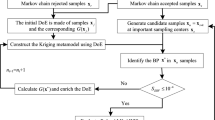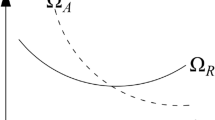Abstract
System reliability analysis with small failure probability is investigated in this paper. Because multiple failure modes exist, the system performance function has multiple failure regions and multiple most probable points (MPPs). This paper reports an innovative method combining active learning Kriging (ALK) model with multimodal adaptive important sampling (MAIS). In each iteration of the proposed method, MPPs on a so-called surrogate limit state surface (LSS) of the system are explored, important samples are generated, optimal training points are chosen, the Kriging models are updated, and the surrogate LSS is refined. After several iterations, the surrogate LSS will converge to the true LSS. A recently proposed evolutionary multimodal optimization algorithm is adapted to obtain all the potential MPPs on the surrogate LSS, and a filtering technique is introduced to exclude improper solutions. In this way, the unbiasedness of our method is guaranteed. To avoid approximating the unimportant components, the training points are only chosen from the important samples located in the truncated candidate region (TCR). The proposed method is termed as ALK-MAIS-TCR. The accuracy and efficiency of ALK-MAIS-TCR are demonstrated by four complicated case studies.









Similar content being viewed by others
References
Au S, Beck JL (1999) A new adaptive importance sampling scheme for reliability calculations. Struct Saf 21:135–158
Bichon BJ, Eldred MS, Swiler LP et al (2008) Efficient global reliability analysis for nonlinear implicit performance functions. AIAA J 46:2459–2468
Bichon BJ, McFarland JM, Mahadevan S (2011) Efficient surrogate models for reliability analysis of systems with multiple failure modes. Reliab Eng Syst Saf 96:1386–1395
Bourinet J, Mattrand C, Dubourg V (2009) A review of recent features and improvements added to FERUM software. Proc. of the 10th International Conference on Structural Safety and Reliability (ICOSSAR’09)
Bourinet J, Deheeger F, Lemaire M (2011) Assessing small failure probabilities by combined subset simulation and support vector machines. Struct Saf 33:343–353
Cadini F, Santos ZE (2014) An improved adaptive kriging-based importance technique for sampling multiple failure regions of low probability. Reliab Eng Syst Saf 131:109–117
Cheng R, Li M, Li K et al (2018) Evolutionary multiobjective optimization-based multimodal optimization: fitness landscape approximation and peak detection. IEEE Trans Evol Comput 22:692–706
Deb K, Gupta S, Daum D et al (2009) Reliability-based optimization using evolutionary algorithms. IEEE Trans Evol Comput 13:1054–1074
Der Kiureghian A, Dakessian T (1998) Multiple design points in first and second-order reliability. Struct Saf 20:37–49
Dey A, Mahadevan S (1998) Ductile structural system reliability analysis using adaptive importance sampling. Struct Saf 20:137–154
Ditlevsen O (1979) Narrow reliability bounds for structural systems. J Struct Mech 7:453–472
Du X (2010) System reliability analysis with saddlepoint approximation. Struct Multidiscip Optim 42:193–208
Dubourg V, Sudret B, Bourinet J-M (2011) Reliability-based design optimization using kriging surrogates and subset simulation. Struct Multidiscip Optim 44:673–690
Echard B, Gayton N, Lemaire M (2011) AK-MCS: an active learning reliability method combining Kriging and Monte Carlo simulation. Struct Saf 33:145–154
Echard B, Gayton N, Lemaire M et al (2013) A combined importance sampling and kriging reliability method for small failure probabilities with time-demanding numerical models. Reliab Eng Syst Saf 111:232–240
Fauriat W, Gayton N (2014) AK-SYS: an adaptation of the AK-MCS method for system reliability. Reliab Eng Syst Saf 123:137–144
Gaspar B, Teixeira A, Soares CG (2017) Adaptive surrogate model with active refinement combining Kriging and a trust region method. Reliab Eng Syst Saf 165:277–291
Hu Z, Du X (2018) Integration of statistics- and physics-based methods—a feasibility study on accurate system reliability prediction. J Mech Des 140:074501–074507
Hu Z, Mahadevan S (2016) Global sensitivity analysis-enhanced surrogate (GSAS) modeling for reliability analysis. Struct Multidiscip Optim 53:501–521
Hu Z, Nannapaneni S, Mahadevan S (2017) Efficient Kriging surrogate modeling approach for system reliability analysis. Artif Intell Eng Des Anal Manuf 31:143–160
Jain AK (2010) Data clustering: 50 years beyond K-means. Pattern Recogn Lett 31:651–666
Jiang C, Qiu H, Yang Z et al (2019) A general failure-pursuing sampling framework for surrogate-based reliability analysis. Reliab Eng Syst Saf 183:47–59
Kang W-H, Song J, Gardoni P (2008) Matrix-based system reliability method and applications to bridge networks. Reliab Eng Syst Saf 93:1584–1593
Kurtz N, Song J (2013) Cross-entropy-based adaptive importance sampling using Gaussian mixture. Struct Saf 42:35–44
Li J, Mourelatos ZP (2009) Time-dependent reliability estimation for dynamic problems using a niching genetic algorithm. J Mech Des 131:071009
Pandey MD (1998) An effective approximation to evaluate multinormal integrals. Struct Saf 20:51–67
Razaaly N, Congedo PM (2018) Novel algorithm using active metamodel learning and importance sampling: application to multiple failure regions of low probability. J Comput Phys 368:92–114
Sadoughi M, Li M, Hu C (2018) Multivariate system reliability analysis considering highly nonlinear and dependent safety events. Reliab Eng Syst Saf 180:189–200
Shayanfar MA, Barkhordari MA, Roudak MA (2017) An efficient reliability algorithm for locating design point using the combination of importance sampling concepts and response surface method. Commun Nonlinear Sci Numer Simul 47:223–237
Shir OM (2012) Niching in evolutionary algorithms. In: Rozenberg G, Bäck T, Kok JN (eds) Handbook of Natural Computing. Springer Berlin Heidelberg, Berlin, pp 1035–1069
Sudret B (2008) Global sensitivity analysis using polynomial chaos expansions. Reliab Eng Syst Saf 93:964–979
Sues RH, Cesare MA (2005) System reliability and sensitivity factors via the MPPSS method. Probab Eng Mech 20:148–157
Wang Z, Wang P (2015) An integrated performance measure approach for system reliability analysis. J Mech Des 137:021406
Wang P, Hu C, Youn BD (2011) A generalized complementary intersection method (GCIM) for system reliability analysis. J Mech Des 133:071003
Wang Y, Li H, Yen GG et al (2015) MOMMOP: multiobjective optimization for locating multiple optimal solutions of multimodal optimization problems. IEEE Trans Cybern 45:830–843
Wei P, Liu F, Tang C (2018) Reliability and reliability-based importance analysis of structural systems using multiple response Gaussian process model. Reliab Eng Syst Saf 175:183–195
Wen Z, Pei H, Liu H et al (2016) A sequential Kriging reliability analysis method with characteristics of adaptive sampling regions and parallelizability. Reliab Eng Syst Saf 153:170–179
Yang X, Liu Y, Gao Y et al (2015) An active learning Kriging model for hybrid reliability analysis with both random and interval variables. Struct Multidiscip Optim 51:1003–1016
Yang X, Liu Y, Mi C et al (2018a) Active learning Kriging model combining with kernel-density-estimation-based importance sampling method for the estimation of low failure probability. J Mech Des 140:051402
Yang X, Liu Y, Mi C et al (2018b) System reliability analysis through active learning Kriging model with truncated candidate region. Reliab Eng Syst Saf 169:235–241
Yang X, Mi C, Deng D et al (2019a) A system reliability analysis method combining active learning Kriging model with adaptive size of candidate points. Struct Multidiscip Optim 60:137–150
Yang X, Wang T, Li J et al (2019b) Bounds approximation of limit-state surface based on active learning Kriging model with truncated candidate region for random-interval hybrid reliability analysis. Int J Numer Methods Eng (In press)
Yao J, Kharma N, Grogono P (2010) Bi-objective multipopulation genetic algorithm for multimodal function optimization. IEEE Trans Evol Comput 14:80–102
Youn BD, Wang P (2009) Complementary intersection method for system reliability analysis. J Mech Des 131:041004
Funding
This work is supported by the National Natural Science Foundation of China (Grant No. 51705433), the Fundamental Research Funds for the Central Universities (Grant No. 2682017CX028), the Open Project Program of The State Key Laboratory of Heavy Duty AC Drive Electric Locomotive Systems Integration (Grant No. 2017ZJKF04, 2017ZJKF02), and the scholarship of China Scholarship Council.
Author information
Authors and Affiliations
Corresponding author
Ethics declarations
Conflict of interest
The authors declare that they have no conflict of interest.
Replication of results
Detailed procedure of our method is shown in Section 3.6. All tuning parameters are listed in Table 1. Source code of EMO-MMO algorithm is available at https://github.com/ranchengcn/EMO-MMO.
Additional information
Responsible Editor: Nestor V Queipo
Publisher’s Note
Springer Nature remains neutral with regard to jurisdictional claims in published maps and institutional affiliations.
Rights and permissions
About this article
Cite this article
Yang, X., Cheng, X., Wang, T. et al. System reliability analysis with small failure probability based on active learning Kriging model and multimodal adaptive importance sampling. Struct Multidisc Optim 62, 581–596 (2020). https://doi.org/10.1007/s00158-020-02515-5
Received:
Revised:
Accepted:
Published:
Issue Date:
DOI: https://doi.org/10.1007/s00158-020-02515-5




